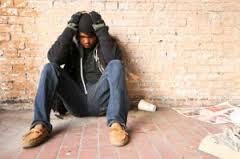What are Signs of Crack Addiction?
Crack cocaine, the most addictive form of cocaine, is a crystal substance that can be smoked, offering a short-lived but more intense high to users. Users may have a high heart rate, experience trouble sleeping and a lack of appetite and feel paranoid, on edge or angry. Those who use the drug often experience a craving for more, coupled by intense depression following the high. The depression experienced when coming down from the drug worsens with each use, and the crack is needed in increasingly larger amounts just to feel normal again. Sleep deprivation and malnutrition can cause other long-term effects, including damage to the heart, liver and kidneys. Users are more likely to acquire an infectious disease, can display aggressive behavior even when not high and experience respiratory distress. Continuing to use crack cocaine interferes with the way the brain works, and those who use the drug lose interest in other areas of their life. Signs of crack addiction can be physical and mental, and addicts may leave physical evidence behind, despite denying drug dependency.
Physical Symptoms
Someone using crack cocaine regularly is likely to display physical signs both when using the drug and after coming down from the high. These most commonly are:
- Dilated pupils
- Dry mouth
- Excessive sweating
- Lack of appetite
- Premature aging
- Talkativeness
- Unable to sleep and restlessness
- Physically active when high, followed by exhaustion
Those who use the drug repeatedly can experience permanent organ damage and health problems, such as:
- High blood pressure
- Lung damage and respiratory failure
- Damage to blood vessels of the ear and brain
- Tooth decay
- Weight loss
- Reproductive damage and infertility
- Chest pain, heart attack or stroke
Mental dependency

If a person is addicted to crack they will experience a mental dependency on the drug.
Tolerance and addiction can begin to occur immediately. According to Narconon, “binge use of crack cocaine can result in a psychotic, over-stimulated state accompanied by paranoia and compulsive behavior.” Other indicators someone is addicted to crack cocaine include:
- Mood swings
- A false sense of confidence and power
- Hallucinations and confusion
- Trouble concentrating
- Anger and agitation
- Depression
- Intense cravings
- Compulsive behavior
- Paranoia
- Increased frequency of risky behavior
Additional Signs
Those who have become addicted to crack cocaine may try to hide their dependency from loved ones. In addition to a deteriorating quality of life, friends and family may find little baggies with off-white crack rooks or residue inside. They may also leave metal or glass crack pipes around. Those who smoke crack may have burned fingers or lips. Suffering work performance, out-of-character outbursts or resorting to crime and theft are indicators that a crack addition has developed.
A person can become addicted and dependent on crack cocaine after just few days. Those who have already developed an addiction may become defensive and isolated. In order to maintain the constant need for more crack, they frequently resort to illegal behavior. It is important to identify and help an addict seek help as soon as possible, in order to reduce the risk of long-term physical and mental effects, or even death.